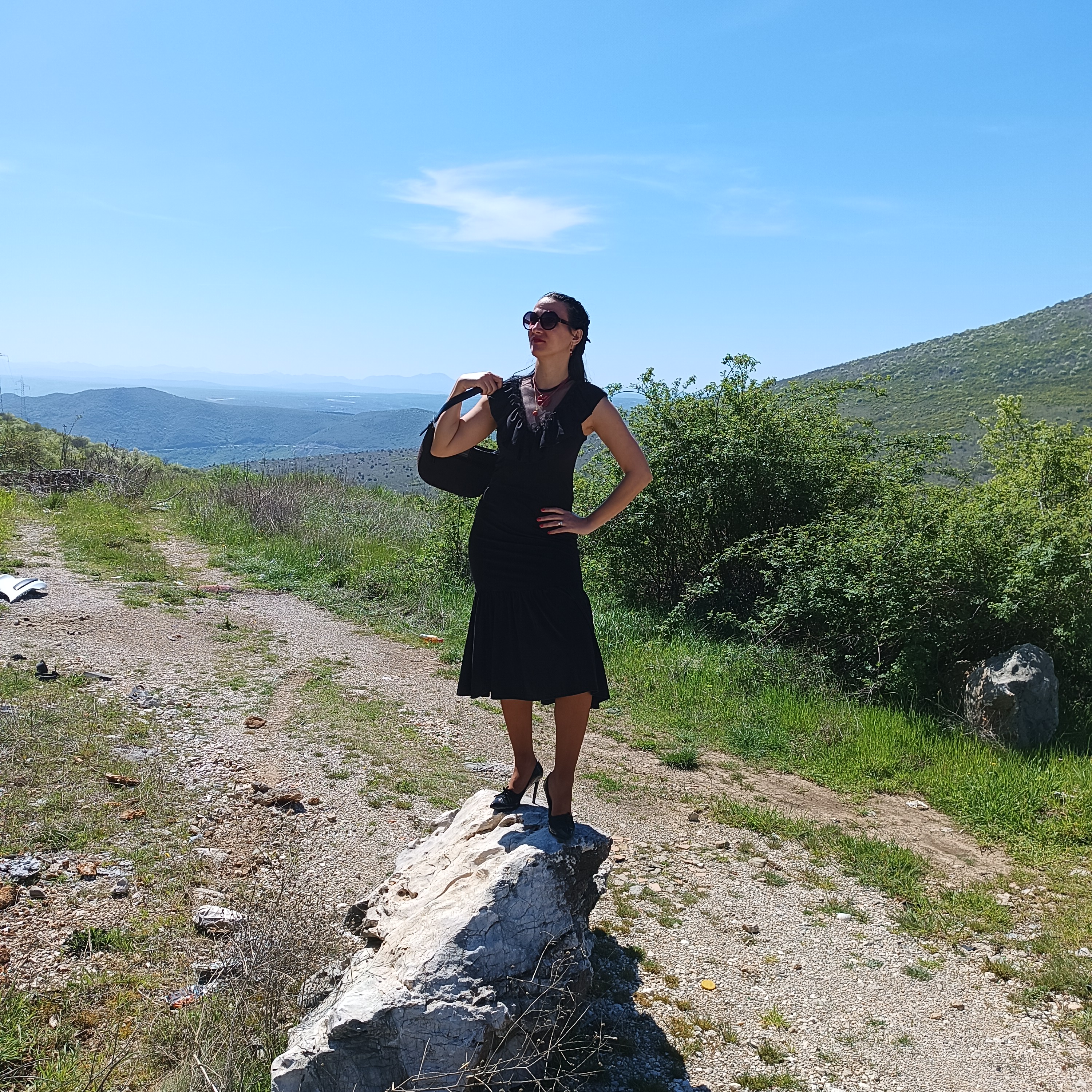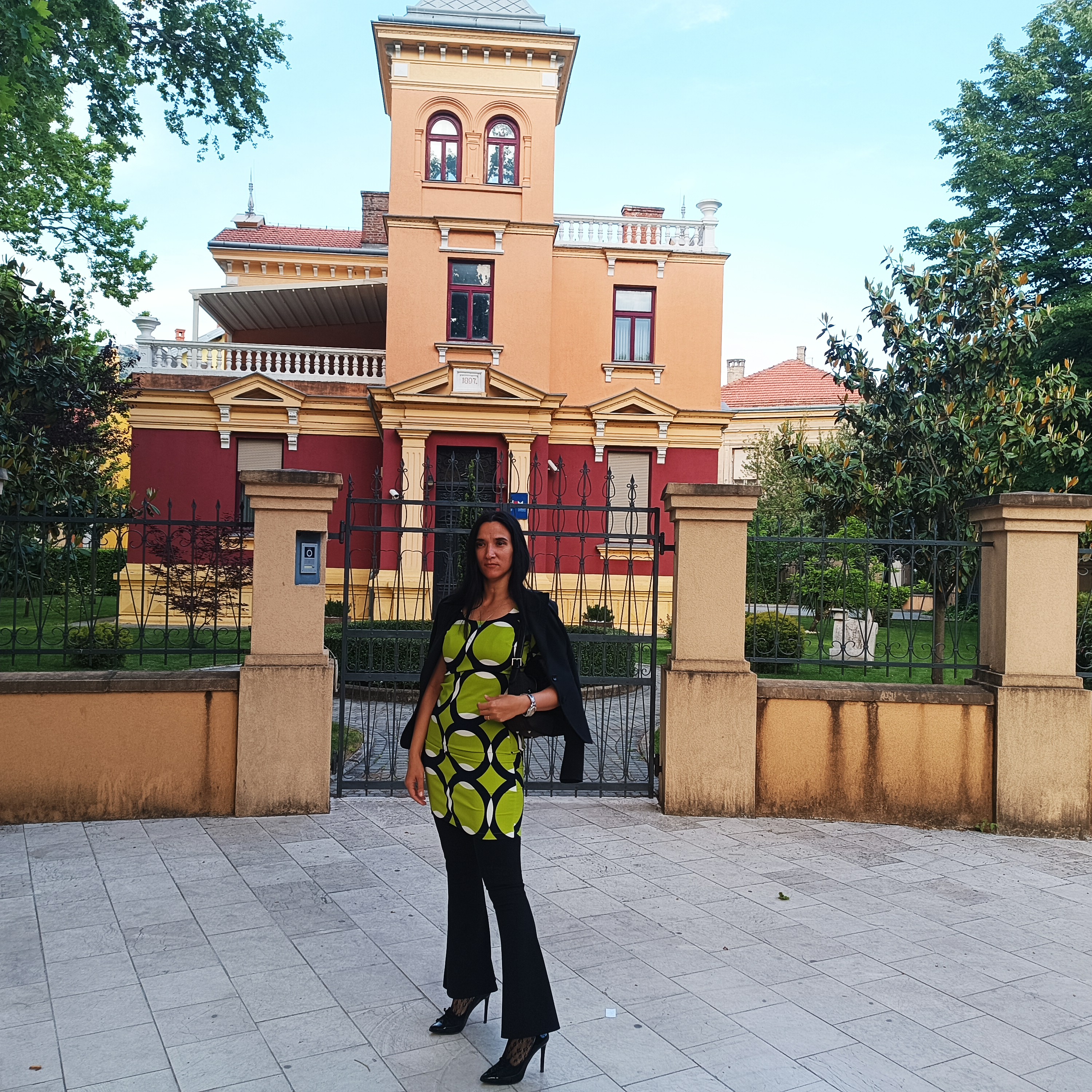Diploma (odjevna kombinacija) ---M.A (outfit post)
As of today I hold a master's degree in:
- Crotian language and literature
- English language and literature
It is not that I'm bragging. Education is after all a matter of privilege. Everyone who wants to study and can afford it can have a degree of his choice. If I hadn't had financial support I would have never had the chance to study and hence graduate so it is not like it is only my personal achievement. Still, I'm very happy today and I want to share it with you.
HUMANISM AND ACTIVE VIRTUE , QUOTED FROM BRITANNICA
https://www.britannica.com/topic/humanism/Active-virtue
Humanism, system of education and mode of inquiry that originated in northern Italy during the 13th and 14th centuries and later spread through continental Europe and England. The term is alternatively applied to a variety of Western beliefs, methods, and philosophies that place central emphasis on the human realm. Also known as Renaissance humanism, the historical program was so broadly and profoundly influential that it is one of the chief reasons why the Renaissance is viewed as a distinct historical period. Indeed, though the word Renaissance is of more recent coinage, the fundamental idea of that period as one of renewal and reawakening is humanistic in origin. But humanism sought its own philosophical bases in far earlier times and, moreover, continued to exert some of its power long after the end of the Renaissance.
Origin and meaning of the term humanism
The ideal of humanitas
The history of the term humanism is complex but enlightening. It was first employed (as humanismus) by 19th-century German scholars to designate the Renaissance emphasis on Classical studies in education. These studies were pursued and endorsed by educators known, as early as the late 15th century, as umanisti—that is, professors or students of Classical literature. The word umanisti derives from the studia humanitatis, a course of Classical studies that, in the early 15th century, consisted of grammar, poetry, rhetoric, history, and moral philosophy. The studia humanitatis were held to be the equivalent of the Greek paideia. Their name was itself based on the Roman statesman Marcus Tullius Cicero’s concept of humanitas, an educational and political ideal that was the intellectual basis of the entire movement. Renaissance humanism in all its forms defined itself in its straining toward this ideal. No discussion of humanism, therefore, can have validity without an understanding of humanitas.
Humanitas meant the development of human virtue, in all its forms, to its fullest extent. The term thus implied not only such qualities as are associated with the modern word humanity—understanding, benevolence, compassion, mercy—but also such more assertive characteristics as fortitude, judgment, prudence, eloquence, and even love of honour. Consequently, the possessor of humanitas could not be merely a sedentary and isolated philosopher or man of letters but was of necessity a participant in active life. Just as action without insight was held to be aimless and barbaric, insight without action was rejected as barren and imperfect. Humanitas called for a fine balance of action and contemplation, a balance born not of compromise but of complementarity.
The goal of such fulfilled and balanced virtue was political, in the broadest sense of the word. The purview of Renaissance humanism included not only the education of the young but also the guidance of adults (including rulers) via philosophical poetry and strategic rhetoric. It included not only realistic social criticism but also utopian hypotheses, not only painstaking reassessments of history but also bold reshapings of the future. In short, humanism called for the comprehensive reform of culture, the transfiguration of what humanists termed the passive and ignorant society of the “dark” ages into a new order that would reflect and encourage the grandest human potentialities. Humanism had an evangelical dimension: it sought to project humanitas from the individual into the state at large.
The wellspring of humanitas was Classical literature. Greek and Roman thought, available in a flood of rediscovered or newly translated manuscripts, provided humanism with much of its basic structure and method. For Renaissance humanists, there was nothing dated or outworn about the writings of Aristotle, Cicero, or Livy. Compared with the typical productions of medieval Christianity, these pagan works had a fresh, radical, almost avant-garde tonality. Indeed, recovering the classics was to humanism tantamount to recovering reality. Classical philosophy, rhetoric, and history were seen as models of proper method—efforts to come to terms, systematically and without preconceptions of any kind, with perceived experience. Moreover, Classical thought considered ethics qua ethics, politics qua politics: it lacked the inhibiting dualism occasioned in medieval thought by the often-conflicting demands of secularism and Christian spirituality. Classical virtue, in examples of which the literature abounded, was not an abstract essence but a quality that could be tested in the forum or on the battlefield. Finally, Classical literature was rich in eloquence. In particular, humanists considered Cicero to be the pattern of refined and copious discourse, as well as the model of eloquence combined with wise statesmanship. In eloquence humanists found far more than an exclusively aesthetic quality. As an effective means of moving leaders or fellow citizens toward one political course or another, eloquence was akin to pure power. Humanists cultivated rhetoric, consequently, as the medium through which all other virtues could be communicated and fulfilled.
Humanism, then, may be accurately defined as that Renaissance movement that had as its central focus the ideal of humanitas. The narrower definition of the Italian term umanisti notwithstanding, all the Renaissance writers who cultivated humanitas, and all their direct “descendants,” may be correctly termed humanists.
English literature, the body of written works produced in the English language by inhabitants of the British Isles (including Ireland) from the 7th century to the present day. The major literatures written in English outside the British Isles are treated separately under American literature, Australian literature, Canadian literature, and New Zealand literature.
English literature has sometimes been stigmatized as insular. It can be argued that no single English novel attains the universality of the Russian writer Leo Tolstoy’s War and Peace or the French writer Gustave Flaubert’s Madame Bovary. Yet in the Middle Ages the Old English literature of the subjugated Saxons was leavened by the Latin and Anglo-Norman writings, eminently foreign in origin, in which the churchmen and the Norman conquerors expressed themselves. From this combination emerged a flexible and subtle linguistic instrument exploited by Geoffrey Chaucer and brought to supreme application by William Shakespeare. During the Renaissance the renewed interest in Classical learning and values had an important effect on English literature, as on all the arts; and ideas of Augustan literary propriety in the 18th century and reverence in the 19th century for a less specific, though still selectively viewed, Classical antiquity continued to shape the literature. All three of these impulses derived from a foreign source, namely the Mediterranean basin. The Decadents of the late 19th century and the Modernists of the early 20th looked to continental European individuals and movements for inspiration. Nor was attraction toward European intellectualism dead in the late 20th century, for by the mid-1980s the approach known as structuralism, a phenomenon predominantly French and German in origin, infused the very study of English literature itself in a host of published critical studies and university departments. Additional influence was exercised by deconstructionist analysis, based largely on the work of French philosopher Jacques Derrida.
Further, Britain’s past imperial activities around the globe continued to inspire literature—in some cases wistful, in other cases hostile. Finally, English literature has enjoyed a certain diffusion abroad, not only in predominantly English-speaking countries but also in all those others where English is the first choice of study as a second language.
English literature is therefore not so much insular as detached from the continental European tradition across the Channel. It is strong in all the conventional categories of the bookseller’s list: in Shakespeare it has a dramatist of world renown; in poetry, a genre notoriously resistant to adequate translation and therefore difficult to compare with the poetry of other literatures, it is so peculiarly rich as to merit inclusion in the front rank; English literature’s humour has been found as hard to convey to foreigners as poetry, if not more so—a fact at any rate permitting bestowal of the label “idiosyncratic”; English literature’s remarkable body of travel writings constitutes another counterthrust to the charge of insularity; in autobiography, biography, and historical writing, English literature compares with the best of any culture; and children’s literature, fantasy, essays, and journals, which tend to be considered minor genres, are all fields of exceptional achievement as regards English literature. Even in philosophical writings, popularly thought of as hard to combine with literary value, thinkers such as Thomas Hobbes, John Locke, David Hume, John Stuart Mill, and Bertrand Russell stand comparison for lucidity and grace with the best of the French philosophers and the masters of Classical antiquity.
Some of English literature’s most distinguished practitioners in the 20th century—from Joseph Conrad at its beginning to V.S. Naipaul and Tom Stoppard at its end—were born outside the British Isles. What is more, none of the aforementioned had as much in common with his adoptive country as did, for instance, Doris Lessing and Peter Porter (two other distinguished writer-immigrants to Britain), both having been born into a British family and having been brought up on British Commonwealth soil.
On the other hand, during the same period in the 20th century, many notable practitioners of English literature left the British Isles to live abroad: James Joyce, D.H. Lawrence, Aldous Huxley, Christopher Isherwood, Robert Graves, Graham Greene, Muriel Spark, and Anthony Burgess. In one case, that of Samuel Beckett, this process was carried to the extent of writing works first in French and then translating them into English.
Danas sam diplomirala! Nije da se hvalim, svatko tko ima priliku i potporu može završiti studij. Ipak magistar struke lijepo zvuči, zar ne? Jako sam sretna danas. Moj studij hrvatskog i engleskog jezika i književnosti došao je kraju. Pošto je danas moj dan obukla sam sve stvari koje volim, a to znači puno uzoraka i materijala. Od pliša do samta do svile...sve je tu;)















Ohhh deeeeeeaaarrrr!!! <3 Congratulations!!! I wish you all the best, all the joy and satisfaction in life!! You're beautiful! <3 :D If I were there, I would have given you a beautiful bouquet of purple flowers! Smmmuackkk
ReplyDeletegrazie:)
DeleteCongrats on your diploma, darlin!!!!
ReplyDeleteYou look so pretty!
Love your shoes!
xxx
S
http://s-fashion-avenue.blogspot.it/
grazie:)
Deletečestitke draga!!!! Obožavam suknju i košulju!!!!!!!!!!! <3 <3 <3 <3 <3
ReplyDeletehvala:)
DeleteCongratulations! You look great:)
ReplyDeleteBest, Zia
http://tisallaboutthefashion.blogspot.in/
thanks:)
DeleteČestitam od srca!!!!!! :)))
ReplyDeleteFino uživaj danas i zasluženo proslavi diplomu :))
Super izgledaš, ovo mi je jedan od tvojih dražih outfita!
Congrats!!!! You look fabulous!!
ReplyDeleteKisses
Francy&Stef
Chic With The Least
Also on Facebook and on Bloglovin’
grazie:)
DeleteIskrene čestitke! :-*
ReplyDeleteCipele su mi vrh! :)
Really really congrats for your degree!!!! And what nice look, like these colors!
ReplyDeletehttp://lowbudget-lowcost.blogspot.it/2013/02/2in1-my-outfits.html
grazie:)
DeleteYou look beautiful and congrats to you...that is wonderful!! It is a priviledge to get an education!! x
ReplyDeletethanks
DeleteCongrats for your degree! :)
ReplyDeleteInternational Giveaway - Tic Tac Living
thanks
DeleteYou look stunning!!! Congrats))!! Thanks for sharing such a nice post!
ReplyDeleteHave a happy time!
Best wishes, Alexandra
www.svetusvet.blogspot.com
thanks:)
DeleteWow - congrats: I believe that´s really your own efford that you have gotten the degrees although you´re right that nearly everybody in the Western civilization could get a degree if he/she it works (hard) for it.
ReplyDeleteYour outfit is a great as which you have reached <3 Hope you have a big party tonight!
xx
Rena
http://www.dressedwithsoul.blogspot.de/
You understood what I meant :) Thank you dear:)
DeleteCongrats for your degree..i' m very happy for you!!!!!
ReplyDeleteThank you for your visit and your nice comment!
NEW POST FROM MFW!
www.angelswearheels.com
grazie:)
Deletecongrats dear!!! you look cool.
ReplyDeletehttp://rock4less.blogspot.co.uk/
thank you
DeleteČestitam! :)
ReplyDeleteWIN DANIEL WELLINGTON WATCH!
http://www.asilosofy.com/
hvala
DeleteWow, big CONRATS.. That is great and I know it. How you feel now. Have a great day.
ReplyDeletehttp://www.fashiondenis.com/
thanks
DeleteCONGRATULATION!!!!!!!!!!!
ReplyDeleteYou look outstanding.
Best Dressed Poland
thank you so much:)
DeleteCONGRATULATION!!!!!!!!!!!!!!!!!!!!!!!!!I am so proud of you welldone!your outfit is amazing,the perfect outfit to get you degree!kisses!
ReplyDeletehttp://shoppingtherapy153.blogspot.gr/
thank you
DeleteWow!! Cestitke na diplomi!! Divno i ponosno izgledas :)
ReplyDeletehttp://lartoffashion.blogspot.com/
congrats!!! thanks for your comment on my blog! giulia
ReplyDeletethefashionmamas.com
grazie:)
DeleteI love your outfit, but most importantly congratulations on your degrees!! I studied law at University when I was longer :), xoxo.
ReplyDeleteI mean't younger lol, so tired, my brain needs a rest, enjoy your night, xx.
DeleteI have typos all the time too:) thanks for commenting
DeleteMa congratulazioni!! Bella ed intelligente!!
ReplyDeleteDon't Call Me Fashion Blogger
Facebook
Bloglovin'
grazie:)
DeleteCongratulazioni cara, e stavi benissimo con questi colori!! Molto belle anche le foto!!
ReplyDeleteFabiola
wildflowergirl
grazie:)
Deletecongratulations!!! :)
ReplyDeletethanks for your comment dear!
Bisous, Marie ♥
thank you:)
DeleteYou look beautiful in this set! And congrats on your degrees, that's fantastic!
ReplyDeletethank you
DeleteOh, congratulations! You look fabulous in this bright outfit.
ReplyDeleteGreat outfit, I love your shoes! x
ReplyDeletethanks
DeleteWoow Complimenti!! :)
ReplyDeleteChocolate Rose Style
grazie
DeleteNice pieces you have chosen here Ivana. You have created an uber stylish outfit!
ReplyDeleteBest Regards
Miss Margaret Cruzemark
http://margaretcruzemark.blogspot.com/
thank you:)
DeleteCestitam ti od srca i zelim ti sve, sve najbolje!
ReplyDeletehvala
DeleteCestitam ! super!
ReplyDeletehvala
DeleteHello Ivana,
ReplyDeletei dont know what i should say, except FANTASTIC!!! In this gorgeous outfit you look so very feminity. I love all of that. This clothing shows me, that you have a great style of elegance fashion.
By your killing legs you must wear these little skirt. Blouse and Jacket are colourful perfect.
Your tights have a great pattern, even they reminds me on snakeskin - i dont like Snakes - they scary me. Skin-coloured tights would surely great looking on that.
Funny that your handbag has almost the same (Snake)pattern as your tights - i think, that was your plan, right?
Congratulations of course for your literature diploma!!! Good job.
Bye.
Jennifer